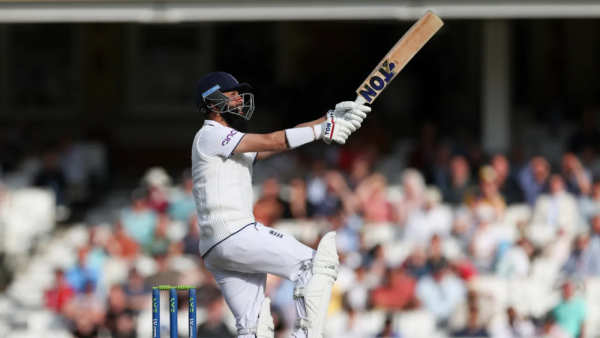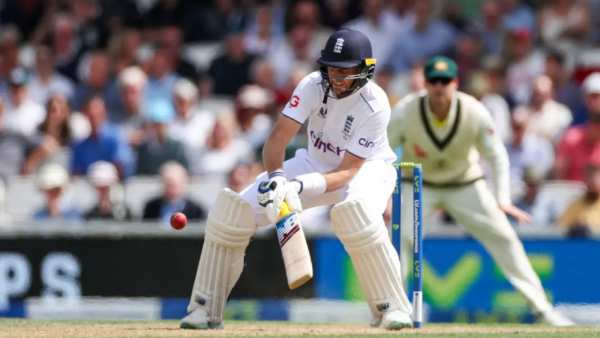There’s a reason Icarus is remembered, and it’s not because of his drab father, who warned him about flying too close to the sun.

England will not win this series,
If one shot summed up the current status of the Ashes series, it occurred in the 75th over of England’s second innings on a tense evening in south London. Mitchell Starc, either side’s leading wicket-taker, charged in with three men out on the hook and dug the ball in short at 88mph.
Moeen Ali, a 36-year-old who retired from Test cricket two months ago due to a groin strain, swiveled on a pull shot, completely stretching his arms. Steven Smith spun to his right, sprawling at full stretch, attempting to flick the ball back into play on the bounce. He couldn’t reach it and landed on top of the LED advertising boards.
Smith lay prone for a few moments, resting his arm on the hoardings, as the crowd celebrated another England boundary, their 48th of the day. It had taken England six balls to erase Australia’s 12-run lead established over 103.1 overs; now, England was 357 ahead.
England will not win this series, but that may suddenly be irrelevant. They have scored at a rate of 4.74 runs per over, averaging 36.58 runs per wicket, and, most significantly, have been a joy to watch. “Can Bazball really work against Starc, Pat Cummins, and Josh Hazlewood?” They have unquestionably won the debate.
England was at their best here, driving the field back with early aggressiveness before cruising along with singles to boundary-riders like they were batting in the middle overs of an ODI. Six of their hitters would finish the series with at least 300 runs scored at an average of more than 35; Ben Stokes’ strike rate of 64.69 was the slowest.
The surge was led by Zac Crawley and Ben Duckett, whose final partnership tally of 79 in 17 overs reflected a slowdown once Cummins eventually pushed the field back. Without the clarity of a run-chase, England have not always found batting in the third innings easy in the recent 14 months; as if to clear any misgivings, Crawley smashed the first ball of the day through cover for four.

But it was Joe Root, who settled into fifth gear after a shaky start, who most exemplified England’s dominance. His best shot, a precise whip through midwicket against Hazlewood, was quickly followed by his most outrageous: a now-characteristic reverse-scoop for six over the slips off Mitchell Marsh.
It’s a testament to Root’s dominance in this series that his run total of 412 at 51.50 feels lower than it should, given how easily he’s scored anytime he’s been set. During the 2015–19 World Cup cycle, Root mastered the technique of middle-overs batting, and Cummins has generally posted 50-over fields as soon as Root reaches 20.
He has been denied a century twice in his previous three innings after being bowled by balls that barely got off the ground after bouncing: the first time by Hazlewood in Manchester and the second time by Todd Murphy at The Oval on Saturday. Nonetheless, by the time he went off with England leading by 320 runs, he had reaffirmed his place among the world’s top batsmen.
In recent days, there has been considerable scoffing about England’s supposed superiority complex, much of it warranted. The unavoidable facts are that they are 2-1 down, have blown several chances in both losses, and will not be able to reclaim the urn until 2025–26.
However, as the series has progressed, it has become evident that England’s strategy has scared Australia. They have crushed India to become World Test Champions and are 2-0 up in the series; barring an unlikely run-chase, they will return home next week regretting a squandered opportunity to secure their legacy.
And, yeah, England’s batters have flown too close to the sun at times during this series. If they had the chance again, they would almost certainly have reined themselves in a little more during the third innings at Edgbaston and similarly on the third morning at Lord’s, when they lost 6 for 47 while constantly going on the short ball on a sluggish surface.
But there’s a reason you remember Icarus’ name rather than the drab father who warned him about the implications. England was a drab, dreary side that was best followed via wicket notifications and social media lowlights two years ago; now, a comparable set of players is arrestingly watchable, and their fans want to watch every ball.
Two days of rain in Manchester robbed this series of its merited conclusion, as well as the type of spectacular event that cricket in England so urgently needs as it fights for mainstream attention amid constant existential crises. Regardless of the scheduling issues, the Ashes have been the athletic summer’s premier event.
Australia has played some fantastic cricket, and no one is arguing their right to return home with the urn. But England has unquestionably been the series’ protagonist, emitting persistent main-character energy; it was only appropriate that Stuart Broad, the drama’s hero, would steal the show late on Saturday evening.
Stay updated on sports news with our website. Get comprehensive coverage of events, performances, and critical incidents. Visit us now!



